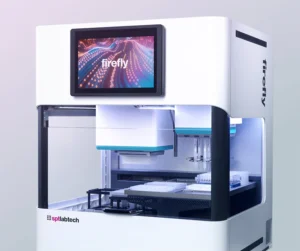SPT Labtech announced a number of new developments regarding its firefly® all-in-one genomics liquid handling platform. Targeted to address the bottlenecks of NGS library preparation in Laboratory Developed Tests (LDTs), more details regarding these developments will be available at the current American Society of Human Genetics conference in Washington, DC.
Since its launch in February 2022, firefly has focused on bringing together capabilities for accurate pipetting, non-contact reagent dispensing, shaking and incubating within a compact benchtop design, and automating repetitive and menial liquid handling tasks, according to a company spokesperson, who notes that firefly features and recent updates that address the needs of clinical labs offering LDTs include compact design, user access control, easy-to-use protocols, and open access software.

“After listening to and understanding the needs of laboratories working in clinical settings, we have delivered a solution that truly supports the rigorous demands around throughput and compliance,” says David Newble, CEO at SPT Labtech. “firefly will enable laboratories to remain agile and adaptive as NGS-based LDTs become more prevalent.”
Rapidly growing industry
Worldwide revenue generated by the laboratory developed test market was $7.3 billion at the end of 2021, with the market estimated to reach a market valuation of $14.4 billion by the end of 2032, according to a recent study by www.medgadget.com. The company reports that the LDT market is a rapidly growing industry that is driven by the increasing demand for advanced diagnostic testing. LDTs are diagnostic tests that are developed and performed by a single laboratory and are typically used to detect genetic and rare diseases.
One of the major drivers of the LDT market is the increasing demand for personalized medicine, states the Megadget market report. With the rise of genetic testing, LDTs can be used to identify specific genetic mutations that may be associated with a particular disease. This allows for more accurate and personalized treatment, which can improve patient outcomes. Additionally, LDTs can also be used to detect rare diseases, which are often overlooked by traditional diagnostic tests.



